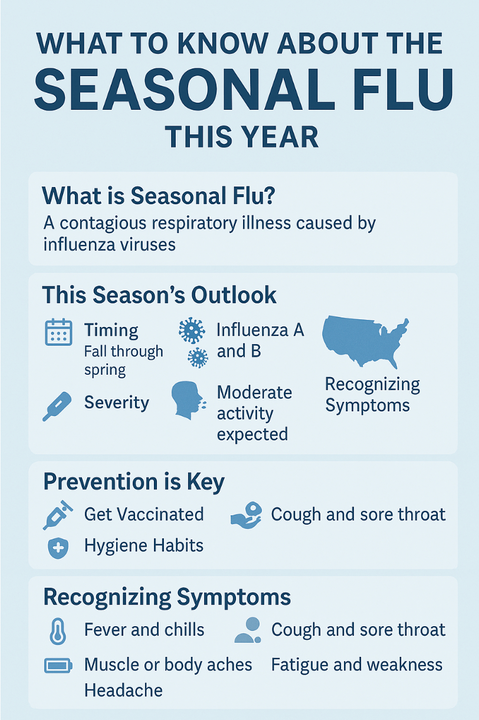What to Know About the Seasonal Flu This Year
As cooler weather sets in, flu season returns. Each year brings new strains, evolving guidance, and fresh considerations for keeping yourself and your loved ones healthy. At Truway Health, we believe that preparation and knowledge are the best defenses. Here’s what you need to know for this flu season.
1. What is Seasonal Flu?
Seasonal influenza (“the flu”) is a contagious respiratory illness caused by influenza viruses. It spreads mainly through droplets when people cough, sneeze, or talk. The flu can affect anyone but tends to be more severe in children, older adults, pregnant women, and individuals with chronic health conditions.
2. This Season’s Outlook
-
Timing: Flu season typically begins in the fall and peaks between December and February, though activity can last into May.
-
Strains: Health authorities monitor circulating strains (commonly Influenza A and B) to update vaccines. This season’s flu shot is designed to protect against the most likely strains.
-
Severity: While it’s impossible to predict the exact severity of the season, experts anticipate moderate activity levels with pockets of higher transmission in colder regions.
3. Prevention is Key
-
Get Vaccinated: The annual flu shot is the most effective way to reduce your risk of infection and complications.
-
Boost Your Immunity: Eat nutrient-rich foods, exercise regularly, and get enough sleep to keep your immune system strong.
-
Hygiene Habits: Wash hands often, cover coughs and sneezes, and avoid touching your face.
4. Recognizing Symptoms
The flu often appears suddenly. Common symptoms include:
-
Fever and chills
-
Cough and sore throat
-
Muscle or body aches
-
Fatigue and weakness
-
Headache
If you experience shortness of breath, chest pain, or persistent high fever, seek medical care promptly.
5. Treatment and Care
-
Rest and Hydration: Allow your body time to recover.
-
Over-the-Counter Relief: Pain relievers, decongestants, and cough suppressants can help manage symptoms.
-
Antiviral Medications: For those at high risk or with severe cases, a healthcare provider may prescribe antiviral drugs like oseltamivir (Tamiflu).
6. Protecting Others
-
Stay home if you’re sick.
-
Wear a mask when around others.
-
Limit contact with vulnerable groups, such as infants and older adults.
7. Final Thoughts
Flu season doesn’t have to be overwhelming. By staying informed, getting vaccinated, and practicing healthy habits, you can reduce your risk and help protect your community.
At Truway Health, we’re committed to providing the tools, products, and knowledge you need to stay well all season long.
Truway Health News & Insights
Consistency Over Intensity: How to Make Wellness Stick
Consistency Over Intensity: How to Make Wellness Stick Wellness and self-care goals often start with...
Mobile‑Integrated Behavioral Activation With Wearable Sensor Support and Decentralized Verification: Protocol for a Randomized Behavioral Trial
Abstract Background: Behavioral activation delivered through mobile platforms has shown promise for...
When Your Body Won’t Settle Down Everyday Habits That Calm Inflammation
When Your Body Won’t Settle Down: Everyday Habits That Calm Inflammation Inflammation is a normal bi...
Truway Health Launches Innovative In-Vitro Cryo-Therapeutic Clinical Study
Advancing Cellular Preservation, Precision Therapy, and Translational Science Truway Health, Inc. is...
Everyday Stress, Handled: Practical Ways to Feel More Steady Day to Day
Everyday Stress, Handled: Practical Ways to Feel More Steady Day to Day Everyday stress is the mind-...
Creating Your Personalized Health Roadmap: Break Bad Habits and Build Long-Term Well-Being
Creating Your Personalized Health Roadmap: Break Bad Habits and Build Long-Term Well-Being Improving...







